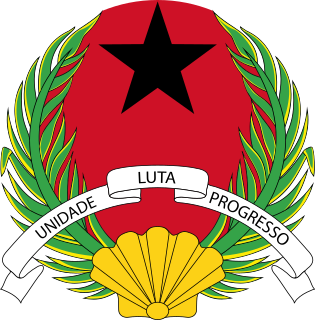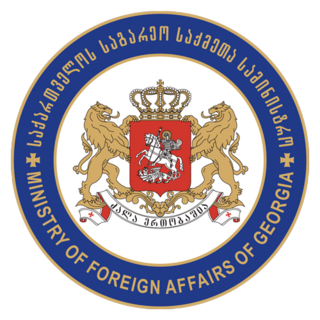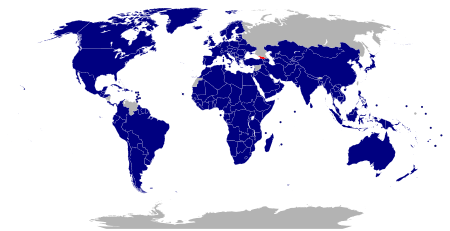
Since its independence, Armenia has maintained a policy of complementarism by trying to have positive and friendly relations with Iran, Russia, and the West, including the United States and the European Union. It has full membership status in a number of international organizations and observer status, etc. in some others. However, the dispute over the Armenian genocide of 1915 and the ongoing Nagorno-Karabakh conflict have created tense relations with two of its immediate neighbors, Azerbaijan and Turkey.

Burundi's relations with its neighbours have often been affected by security concerns. Hundreds of thousands of Burundian refugees have at various times crossed to neighboring Rwanda, Tanzania, and the Democratic Republic of the Congo. Hundreds of thousands of Burundians are in neighboring countries as a result of the ongoing civil war. Most of them, more than 340,000 since 1993, are in Tanzania. Some Burundian rebel groups have used neighboring countries as bases for insurgent activities. The 1993 embargo placed on Burundi by regional states hurt diplomatic relations with its neighbors; relations have improved since the 1999 suspension of these sanctions.

Cyprus is a member of the United Nations along with most of its agencies as well as the Commonwealth of Nations, World Bank, International Monetary Fund and Council of Europe. In addition, the country has signed the General Agreement on Tariffs and Trade (GATT) and the Multilateral Investment Guarantee Agency Agreement (MIGA). Cyprus has been a member of the European Union since 2004 and in the second half of the 2012 it held the Presidency of the Council of the European Union.

Fiji has experienced many coups recently, in 1987, 2000, and 2006. Fiji has been suspended various times from the Commonwealth of Nations, a grouping of mostly former British colonies. It was readmitted to the Commonwealth in December 2001, following the parliamentary election held to restore democracy in September that year, and has been suspended again because of the 2006 coup, but has been readmitted a second time after the 2014 election. Other Pacific Island governments have generally been sympathetic to Fiji's internal political problems and have declined to take public positions.

Kyrgyzstan favors close relations with other members of the Commonwealth of Independent States, particularly Kazakhstan, Turkey and Russia.

Foreign relations of Latvia are the primary responsibility of the Ministry of Foreign Affairs. Today's Republic of Latvia regards itself as a continuation of the 1918–1940 republic. After the declaration on the restoration of its full independence on August 21, 1991, Latvia became a member of the United Nations on September 17, 1991, and is a signatory to a number of UN organizations and other international agreements. Latvia welcomes further cooperation and integration with NATO, European Union, OECD and other Western organizations. It also seeks more active participation in UN peacekeeping efforts worldwide.

Lesotho's geographic location makes it extremely vulnerable to political and economic developments in South Africa. Its capital is the small city of Maseru. It is a member of many regional economic organizations including the Southern African Development Community (SADC) and the Southern African Customs Union (SACU). Lesotho also is active in the United Nations, the Organisation of African Unity, now the African Union, the Non-Aligned Movement, and many other international organizations. In addition to the Republic of Korea, the United States, South Africa, Ireland, People's Republic of China, Libya, and the European Union all currently retain resident diplomatic missions in Lesotho. Foreign relations of Lesotho are administered by the Ministry of Foreign Affairs and International Relations.

Malawi's former President Bakili Muluzi continued the pro-Western foreign policy established by his predecessor, Hastings Banda. It maintains excellent diplomatic relations with principal Western countries. Malawi's close relations with South Africa throughout the apartheid era strained its relations with other African nations. Following the collapse of apartheid in 1994, Malawi developed, and currently maintains, strong diplomatic relations with all African countries.

Foreign relations of Tajikistan are based on a desire to secure foreign investment and promote regional security while ensuring Tajikistan's independence. Sirodjidin Aslov is the current Foreign’s Minister of Tajikistan.

Modern Trinidad and Tobago maintains close relations with its Caribbean neighbours and major North American and European trading partners. As the most industrialized and second-largest country in the English-speaking Caribbean, Trinidad and Tobago has taken a leading role in the Caribbean Community (CARICOM), and strongly supports CARICOM economic integration efforts. It also is active in the Summit of the Americas process and supports the establishment of the Free Trade Area of the Americas, lobbying other nations for seating the Secretariat in Port of Spain.

Uganda has formal diplomatic relations with many countries, some accredited. Since the colonial era and after independence Uganda has grown to be one of the most important African countries. Uganda has diplomatic relations with many countries throughout Africa, the Americas, Asia, Europe and Oceania. Uganda is a member of the United Nations and the Commonwealth of Nations since 1962.

The Gambia followed a formal policy of non-alignment throughout most of former President Dawda Jawara's tenure. It maintained close relations with the United Kingdom, Senegal, and other African countries. The July 1994 coup strained The Gambia's relationship with Western powers, particularly the United States. Starting in 1995, President Yahya Jammeh established diplomatic relations with several additional countries, including Libya, the Republic of China, and Cuba. During his last years, the EU grew increasingly intolerant of Jammeh's iron-fist rule. Consequently, Brussels withheld millions of Euros to The Gambia. Jammeh fired back by expelling the EU's top diplomat in the country after he had accused the bloc and human rights activists of conniving to besmirch the image of his government for its stance on homosexuality.

The Republic of Guinea-Bissau follows a nonaligned foreign policy and seeks friendly and cooperative relations with a wide variety of states and organizations. France, Portugal, Angola, Brazil, Egypt, Nigeria, Libya, Cuba, the Palestine Liberation Organization, Ghana, and Russia have diplomatic offices in Bissau.

Foreign relations of Sri Lanka refers to the diplomatic and commercial relations between Sri Lanka and other countries. Sri Lanka has stressed its principle of "friendship towards all, enmity towards none" in its diplomacy.

The Ministry of Foreign Affairs of Georgia is a governmental body of Georgia responsible for protecting and promoting Georgia’s interest and its persons and entities abroad. The Ministry is led by the Minister of Foreign Affairs who is appointed by the Prime Minister of Georgia as a member of cabinet. The position is currently held by Ilia Darchiashvili, in office since 04 April 2022.

The Minister of Foreign Affairs of Georgia is the head of the Ministry of Foreign Affairs of Georgia, the governmental body of Georgia responsible for protecting and promoting Georgia’s interest and its persons and entities abroad. The minister is a member of the Cabinet of Georgia.

Visitors to Georgia must obtain a visa from Georgian diplomatic missions unless they come from one of the visa exempt countries or one of the countries whose citizens can obtain an e-Visa. Visitors must hold a passport valid for the period of intended stay, while Georgian citizens can enter with a valid or expired passport or identity card.

The Ministry of Internal Affairs of Georgia, abbreviated MIA (შსს), is the highest state law enforcement agency of Georgia, the head of which (Minister) is a member of the Government. The Ministry is accountable to the Government and fulfills the tasks imposed on it by the Prime Minister.

Mikheil Janelidze is a chairman of Center for European Governance & Economy and a former Georgian government official who served as Vice Prime Minister (2017–2018), Minister of Foreign Affairs (2015–2018), First Deputy Minister of Foreign Affairs (2015) and Deputy Minister of Economy and Sustainable Development of Georgia (2011-2015).

The Embassy of Georgia in The Hague is the diplomatic mission of Georgia to the Kingdom of the Netherlands. It is located at Lange Vijverberg 12 in The Hague. The Embassy was established in 2007 after the establishment of diplomatic relations between Georgia and the Netherlands on April 22, 1992 and relocated to its current address in 2017. Prior to the opening of the Embassy, Georgia covered diplomatic relations with the Netherlands through its diplomatic mission in Brussels.






















